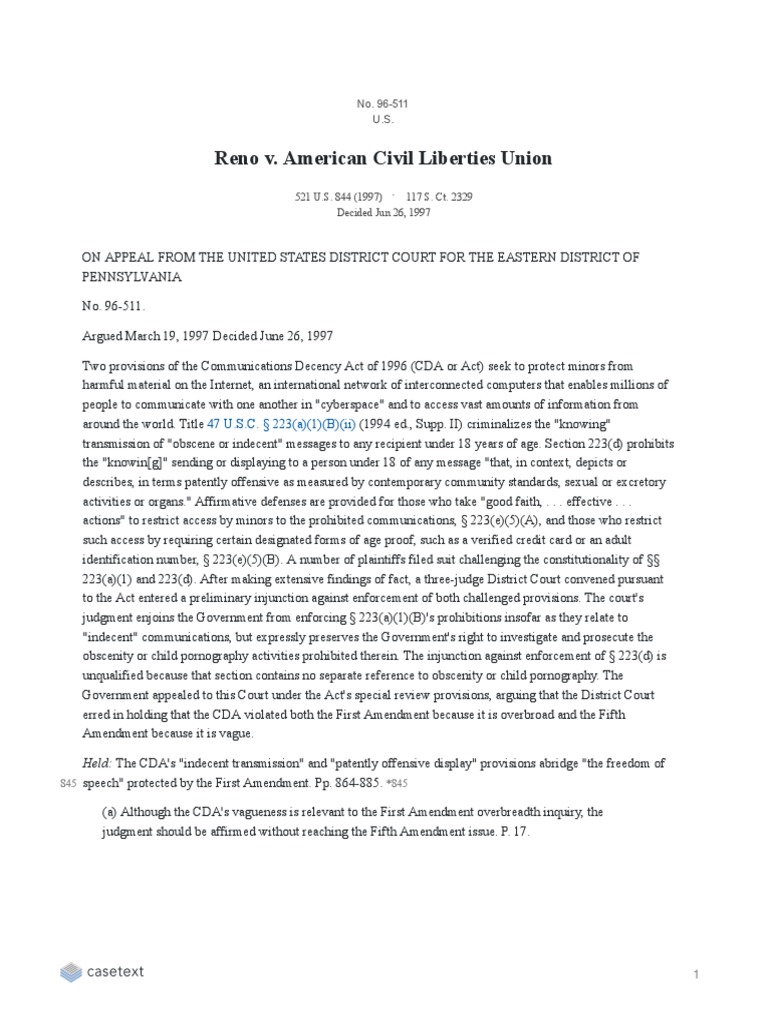Reno V American Civil Liberties

The landmark case of Reno v. American Civil Liberties Union (ACLU) is a significant event in the history of internet regulation and the fight for online freedoms. This legal battle, often referred to simply as Reno v. ACLU, played a pivotal role in shaping the early days of the World Wide Web and continues to influence the discourse surrounding online expression and censorship.
In the late 1990s, the internet was still in its infancy, but its potential as a powerful tool for communication and free speech was already evident. The Reno v. ACLU case arose from concerns over the Communications Decency Act (CDA), a US legislation aimed at restricting indecent or obscene material on the internet.
The Background: Communications Decency Act

The Communications Decency Act of 1996 was a controversial piece of legislation that sought to regulate online content, particularly focusing on sexually explicit material. The act introduced two key provisions:
- Section 223(a)(1): This section made it a crime to transmit "obscene or indecent" messages to anyone under 18 years old via telecommunications.
- Section 223(d): This section prohibited the use of telecommunications to display "patently offensive" material to anyone who did not consent to receiving it.
The CDA was met with immediate backlash from civil liberties groups and internet advocates, who argued that it infringed on the First Amendment rights to free speech and expression.
The Challenge: ACLU v. Reno

The American Civil Liberties Union, along with a coalition of other organizations and individuals, took up the fight against the CDA. They filed a lawsuit, ACLU v. Reno, against then-Attorney General Janet Reno, challenging the constitutionality of the act.
The ACLU argued that the CDA was an overly broad and vague law that would have a chilling effect on free speech online. They contended that the act could potentially censor a wide range of legitimate and constitutionally protected content, from artistic expression to educational resources.
The case gained significant attention, as it raised crucial questions about the role of government in regulating the internet and the balance between maintaining a safe online environment and preserving free expression.
The Supreme Court Decision
In 1997, the case reached the US Supreme Court, where it was heard as Reno v. American Civil Liberties Union. The Supreme Court’s decision, delivered in 1997, was a major victory for the ACLU and a landmark moment for internet freedom.
The Court, in a 7-2 decision, ruled that the CDA was unconstitutional under the First Amendment. The majority opinion, written by Justice John Paul Stevens, argued that the CDA's provisions were overly broad and that the government's interest in protecting children from potentially harmful content could be achieved through less restrictive means.
The Court emphasized the unique nature of the internet as a forum for free expression, stating that "the vast democratic forums of the Internet, unlike the World Wide Web, do not permit inspection or monitoring by anyone other than authorized participants, and they cannot easily be made subject to the sort of governmental or private surveillance that may be a concern with respect to other modes of communication."
This decision effectively struck down the CDA and set a precedent for the treatment of online speech and expression. It established that the internet, despite its relatively new status, deserved the same constitutional protections as traditional media.
Impact and Legacy
The Reno v. ACLU case had far-reaching implications for the development of the internet and its role in society.
Free Speech Online
The decision solidified the principle that online speech is protected by the First Amendment. It opened the doors for a thriving digital landscape where ideas, information, and creative works could be shared freely without fear of government censorship.
Self-Regulation and Parental Controls
Recognizing the concerns about protecting children online, the Court suggested that self-regulation and parental controls could be more effective tools than government-imposed restrictions. This approach has since been widely adopted, with many online platforms and browsers offering user-controlled filters and settings to manage content exposure.
Digital Communication Revolution
The case occurred at a pivotal moment in the internet’s history, just as it was becoming a mainstream communication tool. The ruling contributed to the rapid expansion and acceptance of the internet as a vital medium for information, commerce, and social interaction.
Ongoing Legal Battles
While Reno v. ACLU set a crucial precedent, the fight for internet freedoms has continued. Subsequent cases have addressed issues such as online anonymity, copyright enforcement, and the application of traditional laws to the digital realm.
Global Influence
The principles established in this case have had an impact beyond US borders. Many countries have looked to the US legal system’s approach to internet regulation, influencing global discussions on online freedoms and censorship.
Conclusion

The Reno v. American Civil Liberties Union case stands as a testament to the power of legal advocacy in shaping the internet we know today. It affirmed the internet’s status as a unique and powerful platform for free expression, and its impact continues to be felt in ongoing debates about online freedoms and regulation.
What was the main argument of the ACLU in Reno v. ACLU?
+The ACLU argued that the Communications Decency Act (CDA) was an unconstitutional infringement on the First Amendment rights to free speech and expression. They contended that the act’s provisions were overly broad and could potentially censor a wide range of legitimate and protected content.
How did the Supreme Court’s decision in Reno v. ACLU impact internet regulation?
+The decision established that online speech is protected by the First Amendment, setting a precedent for the treatment of internet content. It encouraged self-regulation and parental controls over government censorship, and its principles have influenced global discussions on online freedoms.
What were the key provisions of the Communications Decency Act (CDA)?
+The CDA introduced Section 223(a)(1), which criminalized transmitting “obscene or indecent” messages to minors, and Section 223(d), which prohibited displaying “patently offensive” material to non-consenting individuals.



